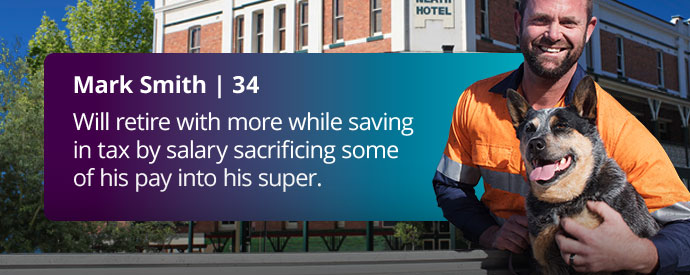Retirement can feel like a long way off, but investing extra money into your super is one way you can help set yourself up for a comfortable retirement. One of the great benefits of super is that earnings are taxed at a low rate. So, unlike other types of investments, any earnings you make on your super will be taxed at a maximum of 15% instead of your marginal tax rate. For example, if you invest your money in the share market, your earnings could be taxed at a rate of up to 47% (including Medicare levy), depending on your income. But any investment earnings in super are only taxed at a maximum of 15% (catch being, you can’t access this until you reach preservation age).
How to boost your super
Before-tax contributions
Also known as salary sacrificing, this is money you put into your super before any tax is taken out. There are two good reasons to salary sacrifice: you'll give your super balance a boost and you’ll pay less tax on your salary. To set up regular payments into your super you need to ask your employer to add money from your before-tax pay.

After-tax contributions
These contributions are made from your after-tax take home pay and aren’t taxed within super. After-tax contributions are also referred to as ‘non-concessional contributions’. They include contributions from your take home pay after your tax is taken out, or from other savings.

Based on fictitious persons. Rules and eligibility criteria apply. *Source: Super Guru small change, big savings tool. Based on a 30-year-old invested in a high growth investment option, making after-tax contributions.
Super tip
If you haven't used all of your before-tax contributions cap by the end of the financial year, you can boost your super with an after-tax contribution and claim it as a tax deduction. This will convert it into a before-tax contribution and may reduce the amount of tax you need to pay, depending on your personal situation. If you do this, please send us a completed Notice of intent to claim or vary a deduction for personal super contributions (PDF) form when making your payment.
Helpful information before you get started
There are caps, or limits on how much you can add to your super each year and benefit from tax concessions. How much you can add depends on whether you’re making before-tax or after-tax contributions. Find out more in the How much can I add to my super account? factsheet (PDF).
Government co-contribution: If you're a low-income earner, adding after-tax money to super may qualify you to receive a government co-contribution of up to $500. Check out our Boost your super with the government co-contribution factsheet (PDF) for more information.
Spouse contributions: If your spouse has a low income or isn't currently working, you can both benefit if you add money to their account. They'll be rewarded with a boost to their super and you can get get a tax offset of up to $540. Find out more on the Grow my spouse’s super page.
Downsizer contribution measure: Eligible home owners aged 55 and over can contribute up to $300,000 into their super from the proceeds of selling their main home, without it counting towards any contribution caps. Read more in the Downsizer contribution measure factsheet (PDF).
Using the carry forward rule: This allows you to use your unused before-tax contributions cap. From 1 July 2018 if you have a total super balance of less than $500,000 on 30 June of the previous financial year, you may be entitled to contribute more than the general annual before-tax contributions cap. This means you can make additional before-tax contributions for any unused amounts in previous years. The first year you were entitled to the carry forward arrangement of unused amounts was the 2019–20 financial year. Unused amounts are available for a maximum of five years and will expire after this period. Read more in the How much can I add to my super account factsheet (PDF).
Combining your super: If you have multiple super accounts you could be paying fees and insurance premiums for each one. It can really add up. Combining your super could make your super easier to manage and might leave you with a bigger balance in retirement. Read more on the Combine your super page.
There are lots of factors which influence how much you need for retirement, such as when you want to retire, what sort of lifestyle you have or want to have, whether you own your home, or if you still have dependants. You can check out this Super Guru calculator to see how much super you should have today to reach a comfortable retirement by age 67.
Small change now can mean a big change later
Adding an extra $10 a week to your super, could mean an extra $18,179 in retirement1. Even small contributions can really snowball over time. And the earlier you start, the better, so forming good habits now can really pay off in the future! Head to the Super Guru website to check what small changes you can make now to save big later.
How to get started
1. Decide which options works for you
Before-tax contributions (salary sacrifice): you can ask your employer to make payments for you as a payroll deduction.
After-tax contributions: you can make payments yourself via BPAY®.
2. Make a payment through my employer (salary sacrifice)
Print out the Authority to deduct from my pay (PDF) form. Fill in the form and give to your employer.
3. Make a payment with BPAY® (after-tax contributions)
Log in to your bank account to set up a BPAY® payment. You can do this as a one off or a regular direct debit.
Re-contribution of COVID-19 early release of super
Did you access your super as part of the COVID-19 early release of super program? You can now recontribute up to the amount you received without it counting towards your after-tax contributions cap. Check out the Australian Taxation Office website for more information.
Things to consider
Before topping up your super you should consider what's best for you. The MoneySmart Super Contribution Optimiser helps you work out what type of contribution will give your super the biggest boost.
Contributions may be subject to limits, or contribution caps, and criteria set by the government.
If you're over the age of 67 but under 75 years of age and wish to claim a tax deduction on your contributions, you'll need to meet the 'work test'. Check out the Australian Taxation Office website for more information.
If you're unsure, don't forget we're here to help. You can giVe us a call on 13 64 63 or email help@mine.com.au. If your needs are more complex, we can put you in touch with a financial adviser from Mine Super Financial Advice.
1 Calculation made using Super Guru calculator and based on a 35-year-old person putting an additional $10 each week into their super account as an after-tax contribution, assuming 4.80% pa growth over 32 years (and retiring at age 67). Calculation as at 28 March 2022.
® Registered to BPAY Pty Ltd ABN 69 079 137 518
